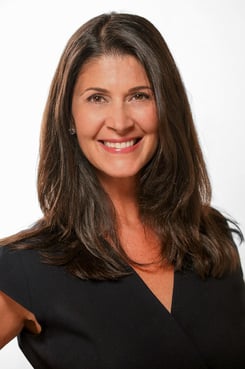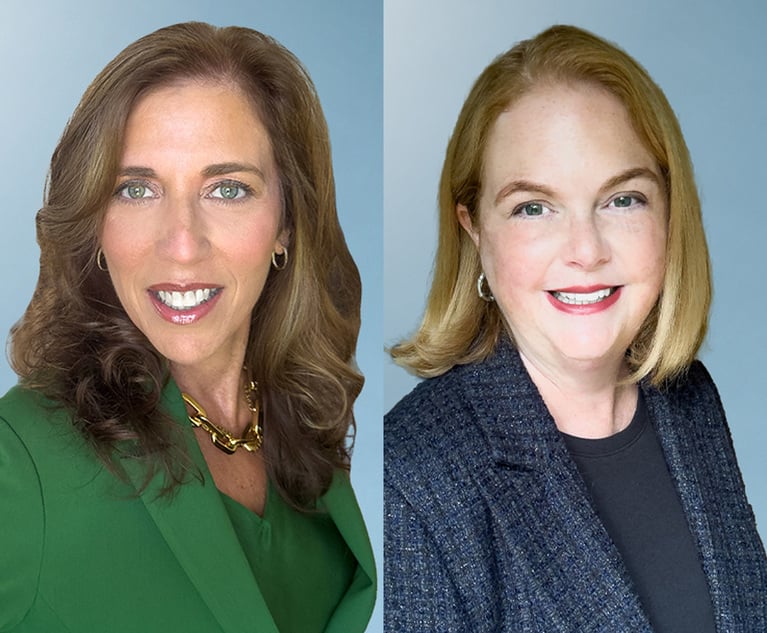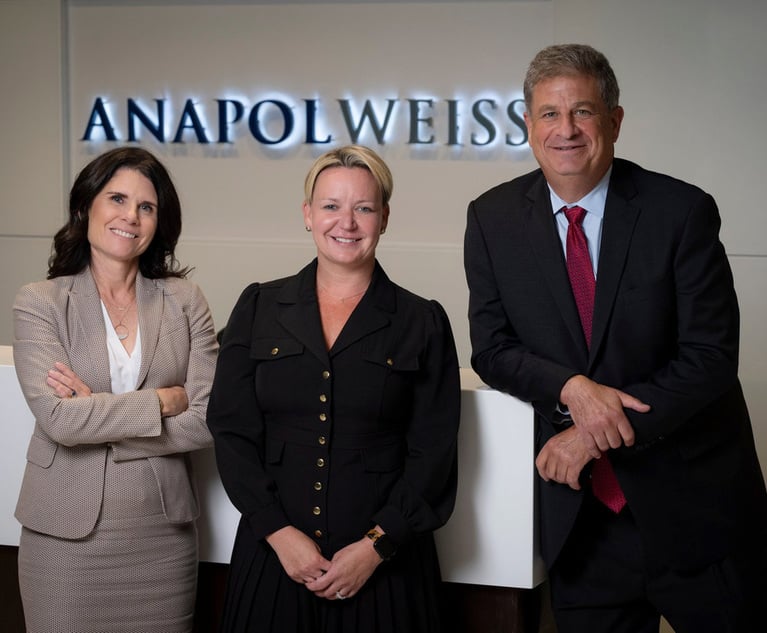How to Score an In-House Job Without In-House Experience
Whether you're a litigator or a transaction lawyer, the lack of in-house experience can put you at a competitive disadvantage when applying for an in-house position.
April 27, 2018 at 11:30 AM
5 minute read

Q: I'm a law firm lawyer and have lost out on in-house jobs to lawyers with in-house experience. How do I overcome this objection?
A: Whether you're a litigator or a transaction lawyer, the lack of in-house experience can put you at a competitive disadvantage when applying for an in-house position. Historically, employers have waxed and waned on their level of flexibility regarding this requirement and the pendulum has swung back and forth a few times over the course of 15-plus years.
Today, the level of consideration for law firm candidates is mixed. But with all things being equal, an employer will hire the candidate with in-house experience. Why? Because law firm and corporate environments are two completely different worlds … maybe even different planets. And the transition from law firm to in-house can be very challenging. Some lawyers never acclimate while others make the transition over a longer period of time. Neither of which is ideal for an employer.
Candidates who possess in-house experience have already been part of a corporate culture and know how its lawyers operate within it. They have handled the types of legal matters and corporate issues that are part of a corporate environment and have had to work with all the moving parts of a company. As a result, these lawyers don't have to master a steep learning curve and ramp up tends to be much shorter. They are, in other words: A safer bet.
Law firm lawyers on the other hand, work on a variety of matters for different clients. They are hyper-aware of billable hours and keeping track of their time, which is a structure that dominates their world. There are no internal clients and visibility is limited into the inner workings of the company. Consequently, a law firm lawyer isn't “under the skin” of their company client. But rather on the outside, looking in.
While more differences exist, these are the basics. And it is clear to see why a corporate employer might favor a candidate with in-house experience. So how does a law firm lawyer overcome the lack of in-house experience? Below are a few areas that will help persuade an employer in your next interview:
- Diversity. Depth. Deals.
Use the diversity of your clients and deals/matters as a competitive advantage. You're in the trenches and working on a plethora of matters for many clients so you are exposed to more variety, different situations, diverse questions—and perhaps managing multiple matters and multiple teams. It is experience you bring to an in-house role that will serve as a huge value-add for an employer. You've seen a lot and your experience is deep. This is the strongest card you have to play on the substantive side so play it with authority.
- Business Acumen.
This is a crucial skill to have as an in-house lawyer and a quality that employers prioritize. Emphasize that you are a business-oriented lawyer. Provide some examples, and communicate what it means to you and its influence on how you practice. Also articulate the context in which you would use your business acumen in a corporate setting. Demonstrate your knowledge of the company and its industry.
- You Get It.
Many employers don't believe that a law firm lawyer has the slightest idea what it's like to work in a company—hence their apprehension. Let them know that you do: The practice, the values, the collaboration, the service, the culture, the business etc. It can be part of the messaging as to why you want to go in-house or as part of addressing the objection directly.
- Culture.
Culture and “fit” are hugely important in a company. So, articulate that you understand the make-up of a corporate culture and discuss how you would approach your role as a corporate citizen and colleague. Articulate the importance of teamwork, responsiveness and reliability, intellectual curiosity and flexibility. In addition, life in a company can be more fast-paced. Demonstrate how you can move on a dime and pivot when needed.
- Ace The Basics.
Do your homework. Be prepared. Be flexible. Show up on time. Dress appropriately. Firm handshake. Big Smile. Lots of enthusiasm. Be nice to everyone. Message of thanks. If you want to win, you have the ace the basics in your interview process. This is what will maximize your best first impression and give you a running start at landing the job—in-house experience or not. Sounds simple, huh? You'd be surprised at how many people fail in these areas and compromise their candidacies. So if you want to out-compete your in-house competitor, start by buttoning up.
As you continue to pursue in-house opportunities, you'll encounter different levels of openness towards law firm candidates. If any of the above suggestions resonate with you, use them to mitigate objections and demonstrate why you will make a great in-house attorney. It may take a few tries. But if you persist, you are bound to encounter an employer who likes what you have to offer and will be willing to take a chance.
Julie Brush is the founder and author of The Lawyer Whisperer (www.thelawyerwhisperer.com), a career advice column for legal professionals, also found on LinkedIn. She is co-founder of Solutus Legal Search, a legal search/consulting boutique firm, serving as a strategic adviser to lawyers, law firms and corporations.
This content has been archived. It is available through our partners, LexisNexis® and Bloomberg Law.
To view this content, please continue to their sites.
Not a Lexis Subscriber?
Subscribe Now
Not a Bloomberg Law Subscriber?
Subscribe Now
NOT FOR REPRINT
© 2025 ALM Global, LLC, All Rights Reserved. Request academic re-use from www.copyright.com. All other uses, submit a request to [email protected]. For more information visit Asset & Logo Licensing.
You Might Like
View All
Once the LA Fires Are Extinguished, Expect the Litigation to Unfold for Years
5 minute read

Faegre Drinker Adds Three Former Federal Prosecutors From Greenberg Traurig
4 minute read
Anapol Weiss Acquires Boutique Led by Star Litigator Alexandra Walsh
5 minute readTrending Stories
- 1Departing Attorneys Sue Their Former Law Firm
- 2Pa. High Court: Concrete Proof Not Needed to Weigh Grounds for Preliminary Injunction Order
- 3'Something Else Is Coming': DOGE Established, but With Limited Scope
- 4Polsinelli Picks Up Corporate Health Care Partner From Greenberg Traurig in LA
- 5Kirkland Lands in Phila., but Rate Pressure May Limit the High-Flying Firm's Growth Prospects
Who Got The Work
J. Brugh Lower of Gibbons has entered an appearance for industrial equipment supplier Devco Corporation in a pending trademark infringement lawsuit. The suit, accusing the defendant of selling knock-off Graco products, was filed Dec. 18 in New Jersey District Court by Rivkin Radler on behalf of Graco Inc. and Graco Minnesota. The case, assigned to U.S. District Judge Zahid N. Quraishi, is 3:24-cv-11294, Graco Inc. et al v. Devco Corporation.
Who Got The Work
Rebecca Maller-Stein and Kent A. Yalowitz of Arnold & Porter Kaye Scholer have entered their appearances for Hanaco Venture Capital and its executives, Lior Prosor and David Frankel, in a pending securities lawsuit. The action, filed on Dec. 24 in New York Southern District Court by Zell, Aron & Co. on behalf of Goldeneye Advisors, accuses the defendants of negligently and fraudulently managing the plaintiff's $1 million investment. The case, assigned to U.S. District Judge Vernon S. Broderick, is 1:24-cv-09918, Goldeneye Advisors, LLC v. Hanaco Venture Capital, Ltd. et al.
Who Got The Work
Attorneys from A&O Shearman has stepped in as defense counsel for Toronto-Dominion Bank and other defendants in a pending securities class action. The suit, filed Dec. 11 in New York Southern District Court by Bleichmar Fonti & Auld, accuses the defendants of concealing the bank's 'pervasive' deficiencies in regards to its compliance with the Bank Secrecy Act and the quality of its anti-money laundering controls. The case, assigned to U.S. District Judge Arun Subramanian, is 1:24-cv-09445, Gonzalez v. The Toronto-Dominion Bank et al.
Who Got The Work
Crown Castle International, a Pennsylvania company providing shared communications infrastructure, has turned to Luke D. Wolf of Gordon Rees Scully Mansukhani to fend off a pending breach-of-contract lawsuit. The court action, filed Nov. 25 in Michigan Eastern District Court by Hooper Hathaway PC on behalf of The Town Residences LLC, accuses Crown Castle of failing to transfer approximately $30,000 in utility payments from T-Mobile in breach of a roof-top lease and assignment agreement. The case, assigned to U.S. District Judge Susan K. Declercq, is 2:24-cv-13131, The Town Residences LLC v. T-Mobile US, Inc. et al.
Who Got The Work
Wilfred P. Coronato and Daniel M. Schwartz of McCarter & English have stepped in as defense counsel to Electrolux Home Products Inc. in a pending product liability lawsuit. The court action, filed Nov. 26 in New York Eastern District Court by Poulos Lopiccolo PC and Nagel Rice LLP on behalf of David Stern, alleges that the defendant's refrigerators’ drawers and shelving repeatedly break and fall apart within months after purchase. The case, assigned to U.S. District Judge Joan M. Azrack, is 2:24-cv-08204, Stern v. Electrolux Home Products, Inc.
Featured Firms
Law Offices of Gary Martin Hays & Associates, P.C.
(470) 294-1674
Law Offices of Mark E. Salomone
(857) 444-6468
Smith & Hassler
(713) 739-1250






